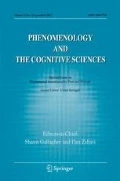Abstract
Recent social theory has departed from methodological individualism’s explanation of action according to the motives and dispositions of human individuals in favor of explanation in terms of broader agencies consisting of both human and nonhuman elements described as cyborgs, actor-networks, extended agencies, or distributed cognition. This paper proposes that moral responsibility for action also be vested in extended agencies. It advances a consequentialist view of responsibility that takes moral responsibility to be a species of causal responsibility, and it answers objections that might be raised on the basis of intentions and deserts.
Similar content being viewed by others
Notes
As the last example indicates, extended agency is an open-ended concept, allowing the addition of ever more participants. The agency that perpetrated vehicular homicide, for example, might also include the conditions of the road, the weather at the time and still other components, depending on the particular circumstances. There comes a point of diminishing returns, where the participation of some elements is so small (e.g., clothing color might have been a factor in the driver’s seeing or not seeing the victim, but whether it was dark brown or dark blue is less significant) or so constant (e.g., the effect of gravity) that they can be disregarded. Since this is a discussion of general concepts rather than exact allocation of responsibility for particular events, it considers only the most obviously important components of any extended agency.
That judgment of course rests on the particular criteria of good and bad in play, and these are subject to cultural, historical and other variables. But that is not pertinent to this theoretical discussion. It is enough to note that the judgment is made.
https://infosec.uga.edu:443/ciso/cs20030602.php, visited 4/12/07.
References
Althusser, L. (1976). Essays in self criticism. London: NLB.
Best, S., & Kellner, D. (1991). Postmodern theory: Critical interrogations. New York: Guildford.
Burckhardt, J. (1954). The civilization of the Renaissance in Italy (S. G. C. Middlemore, Trans.). New York: Modern Library. (Original work published 1860).
Clark, A. (2003). Natural-born cyborgs: Minds, technologies, and the future of human intelligence. New York: Oxford University Press.
Flew, A. (1995). Thinking about social thinking. (2nd ed). Amherst, NY: Prometheus.
Foucault, M. (1970). The order of things: An archaeology of the human sciences. New York: Vintage.
Foucault, M. (1980). Power/knowledge. New York: Pantheon.
Friedman, B., & Kahn, P. H., Jr. (1992). Human agency and responsible computing: Implications for computer system design. Journal of Systems and Software, 17(1), 7–14.
Fromm, E. (1941). Escape from freedom. New York: Rinehart.
Giere, R. N. (2006). Scientific perspectivism. Chicago: University of Chicago Press.
Hanson, F. A. (2004). The new superorganic. Current Anthropology, 45, 467–482.
Haraway, D. J. (1991). Simians, cyborgs, and women: The reinvention of nature. London: Free Association.
Ihde, D. (1990). Technology and the lifeworld. Bloomington: Indiana University Press.
Ihde, D. (2002). Bodies in technology. Minneapolis: University of Minnesota Press.
Johnson, D. G. (2006). Computer systems: Moral entities but not moral agents. Ethics and Information Technology, 8, 195–204.
Jones, R. H. (2000). Reductionism: Analysis and the fullness of reality. Lewisburg, PA: Bucknell University Press.
Kincaid, H. (1997). Individualism and the unity of science: Essays on reduction, explanation, and the special sciences. Lanham: Rowman & Littlefield.
Ladd, J. (1989). Computers and moral responsibility: a framework for an ethical analysis. In C. C. Gould (Ed.), The information web: Ethical and social implications of computer networking. Boulder, CO: Westview.
Law, J., & Hassard, J. (1999). Actor network theory and after. Oxford: Blackwell.
Resnick, L. B., Levine, J. M., & Teasley, S. D. (eds.). (1991). Perspectives on socially shared cognition. Washington, DC: American Psychological Association.
Said, E. W. (2000, December 17). Deconstructing the system [Review of Power: Essential works of Foucault, 1954–1984, Volume Three]. New York Times Book Review, 16–17.
Selinger, E., & Engström, T. (2007). On naturally embodied cyborgs: identities, metaphors, and models. Janus Head, 9, 553–584.
Author information
Authors and Affiliations
Corresponding author
Additional information
Parts of the research on which this article is based were supported by National Science Foundation Grant BCS 92618, fellowships from the National Endowment for the Humanities and the University of Kansas Hall Center for the Humanities, and sabbatical leave from the University of Kansas. I am grateful to Tony Genova and Rex Martin for helpful discussions of the issues and to Louise Hanson, Richard De George, Ben Hale and Timothy Enström for having read and commented on earlier drafts.
Rights and permissions
About this article
Cite this article
Hanson, F.A. The anachronism of moral individualism and the responsibility of extended agency. Phenom Cogn Sci 7, 415–424 (2008). https://doi.org/10.1007/s11097-008-9098-y
Published:
Issue Date:
DOI: https://doi.org/10.1007/s11097-008-9098-y




